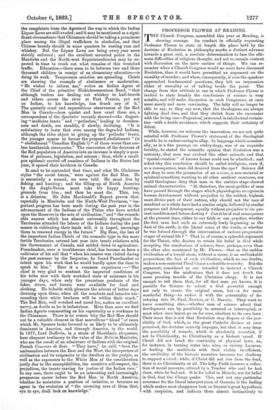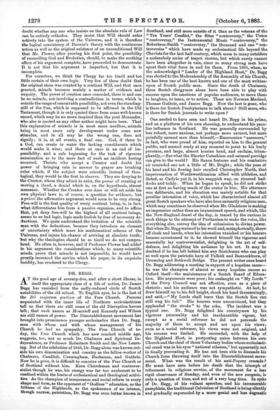PROFESSOR FLOWER AT READING.
THE Church Congress, assembled this year at Reading, is
showing courage. Its conduct in officially requesting Professor Flower to state at length the place held by the doctrine of Evolution in philosophy marks a, distinct advance towards a great end, a resolute determination to face the ulti- mate difficulties of religious thought, and not to remain content with discussion on the mere surface of things. We can re- member when a Church Congress would no more have discussed Evolution, than it would have permitted an argument on the morality of murder; and when, consequently, if ever the speakers approached fundamental questions, they left an impression either of unreality or of talking beside the point. The change from this attitude to one in which Professor Flower is. invited to state frankly the conclusions of science is very notable, and will make discussion in such Congresses at once more manly and more convincing. The laity will no longer be able to say, as they say now, that the theologians are always fighting dead foes, and that they shrink from the encounter with the living one—Paganism; armoured in intellectual certain- ties—with a feeble avoidance which suggests their certainty of defeat.
While, however, we welcome the innovation, we are not quite satisfied with Professor Flower's statement of the theological trouble he is endeavouring to allay. In language which occasion-- ally, as in a fine passage on embryology, was of an exquisite lucidity, he stated the scientific opinion that Evolution was a. certainty, that man was evolved like other animals, and that "special creation" of known forms could not be admitted ; and asked why this conclusion should be called irreligious, even if, as a consequence, man did descend from the ape? Science did not deny to men the possession of an anima, a non-material or spiritual something wanting to all other sentient creatures, nor could theologians deny that man in the embryo stage showed animal characteristics. "If, therefore, the most godlike of men have passed through the stages which physiologists recognise in human development without prejudice to the noblest, highest, most divine part of their nature, why should not the race of mankind as a whole have had a similar origin, followed by similar progress and development, equally without prejudice to its pre- sent condition and future destiny? Can it be of real consequence at the present time, either to our faith or our practice, whether the first man had such an extremely lowly beginning as the dust of the earth, in the literal sense of the words, or whether he was formed through the intervention of various progressive stages of animal life ? " That is, of course, a splendid argument for the Theist, who desires to retain his belief in God while accepting the conclusions of science, finer, perhaps, even than the other also mentioned by Mr. Flower,—that as the sudden vivification of a torpid atom, without a cause, is an unthinkable proposition, the fact of such vivification, which no one doubts, makes a non-material Final Cause a scientific necessity. But the argument, considered as one intended to instruct a Church Congress, has the misfortune that it does not touch the more pressing trouble of the Christian clergy. It is not enough to tell them that, for all that man yet knows, it is possible for Science to admit a God powerful enough not only to create the original atom, but—a far more wonderful thing—to endow it with the potentiality of de- veloping into St. Paul, Newton, or C. Darwin. They want to know something else,—whether men of science admit that development can by possibility be arrested or interrupted, or must when once begun go on for ever, obedient to its own laws. Their inner fear is not that Evolution may dispose of the poi- sibility of God, which, as the great Catholic divines at once perceived, the doctrine scarcely impugns, but that it may deny the possibility of miracle, which is absolutely essential, if' not to Christianity, to Christianity as a historic creed. If Christ did not break the continuity of physical laws, as,, for instance, in turning water into wine, or raising Lazarus, or feeding the multitude with food visibly insufficient, the credibility of the historic narrative becomes too shadowy to support a creed ; while, if Christ did not rise from the dead, there is no Christianity at all. The lofty Faith becomes a collec- tion of moral precepts, uttered by a. Teacher who said he had risen, when he had not. It is for belief in Miracle, not for belief in God, that the Clergy quake. This, and not any particular reverence for the literal interpretation of Genesis, is the feeling which makes most clergymen look on Darwin's great hypothesis with suspicion, and induces them almost instinctively to
doubt whether any one who insists on the absolute rule of Law can be entirely orthodox. They insist that Will should enter actively into the system of the Universe, and it is therefore the logical consistency of Darwin's theory with the continuous action as well as the original existence of an unconditioned Will that Mr. Flower, after proving his first point, the possibility of reconciling God and Evolution, should, to make the soothing effect of his argument complete, have proceeded to demonstrate. It is not that his argument is imperfect, but that it is incomplete.
For ourselves, we think the Clergy far too timid and too little certain of their own logic. Very few of them doubt that the original atom was created by a sentient Will, and that once granted, miracle becomes mainly a matter of evidence and enquiry. The power of creation once conceded, there is and can be no miracle, not involving a contradiction in terms, which is outside the range of conceivable possibility, not even the standing- still of the Sun, which is supposed to be affirmed in the Old Testament, though it is only quoted there from some well-known record, which may be no more inspired than the poet Menander, who also is quoted as any other author might have been. That this explanation of miracle is in most cases needless, miracle being in most cases only development under some new stimulus, and in all may be the wrong one, does not signify ; it is, at all events, a final one. God, if there be a God, can create in water the lacking constituents which would make it wine; and there at once is an end of im- possibility, and a safe beginning for the task of rigorous examination as to the mere fact of such an incident having occurred. Theists who accept a Creator and doubt his power of bringing rain in answer to prayer are breaking rules which, if the subject were scientific instead of theo- logical, they would be the first to observe. They are denying to the Creator, whom they admit to exist, the power of creating or moving a cloud, a denial which is, on the hypothesis, almost nonsense. Whether the Creator ever does or will set aside his own physical laws is, of course, a question for evidence, but a priori the affirmative argument would seem to be very strong. Free-will is the first quality of every sentient being, is, in fact, what differentiates him from a passive organism, and to affirm that, yet deny free-will to the highest of all sentient beings, seems to us bad logic, logic made foolish by fear of necessary de- ductions. We quite understand the irritation of the scientific man with the deductions, because they introduce an element of uncertainty which mars his mathematical scheme of the Universe, and injure his chance of arriving at absolute truth ; but why the theologian should be so timid we do not compre- hend. He often is, however, and if Professor Flower had added to his argument the considerations which, to many scientific minds, prove that miracle is not impossible, he would have greatly increased the service which his paper, in its exquisite lucidity, has rendered to the Clergy.



































 Previous page
Previous page